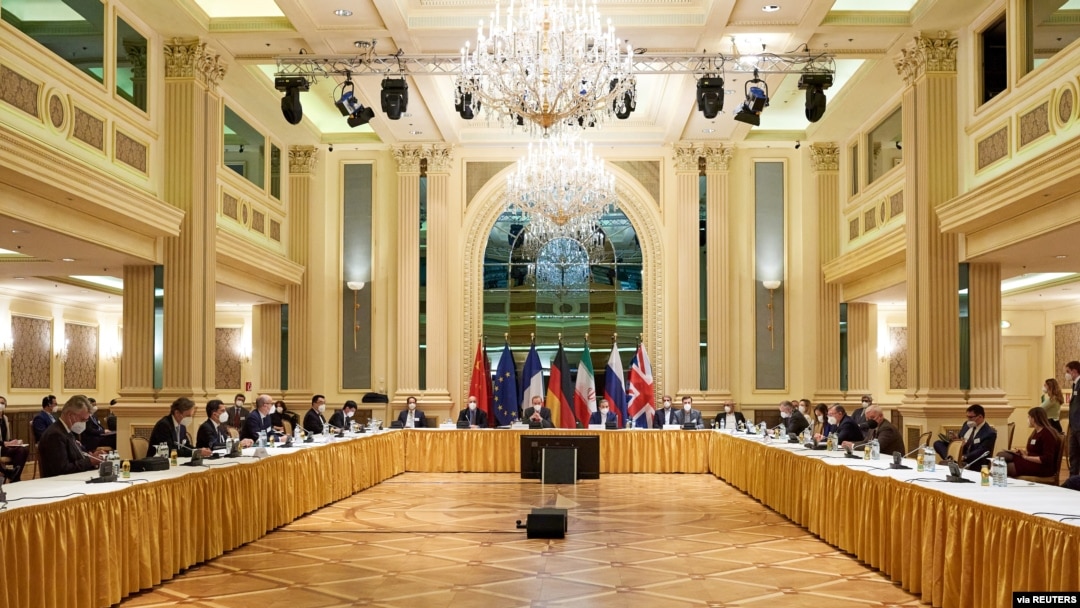European leaders hope the start Tuesday of indirect talks in Vienna between the United States and Iran about reviving an international deal to limit Tehran’s nuclear capabilities, will realign Washington and European policy toward the Islamic Republic.
Then-U.S. President Donald Trump’s withdrawal from the international deal in 2018 and a reimposition of American sanctions on Iran were a major irritant in relations between the U.S. and Europe.
U.S. and Iranian officials from Tehran and Washington are set to hold talks through European intermediaries on the margins of a meeting among Iran and European nations, China and Russia, co-signatories of the landmark 2015 international accord, which restricted Iran’s nuclear program in return for relief from U.S. and international sanctions.
SEE ALSO: Details, Venues Emerge for Talks to Revive Iran Nuclear DealThe U.S. delegation is headed by the Biden administration’s special envoy for Iran, Rob Malley.
The accord is known formally as the Joint Comprehensive Plan of Action (JCPOA). Trump withdrew from the agreement, arguing it was ineffective and was doing nothing to halt “malign” Iranian activities in the Middle East, including the Persian Gulf.
Trump opted instead for what he dubbed a “maximum pressure” campaign on Iran and not only restricted Iran’s ability to sell oil on international markets but also threatened sanctions against foreign companies, including European firms, which chose to trade with Iran. The French energy giant Total was forced to abandon a $4 billion oil deal.
Since the U.S. withdrawal from the deal, Tehran has been violating the restrictions on the amount of enriched uranium it can stockpile, a move partly aimed at pressuring Britain, France and Germany, all signatories, to offset the impact of the reimposed U.S. sanctions. Last September, the three European countries summoned Iran's envoys to admonish them for “serious and constant violations.”
Last week, the International Atomic Energy Agency reported Iran had stepped up production of enriched uranium.
The Europeans are in the process of toughening their strategy toward Iran when it comes to alleged human rights abuses. European Union envoys are set to agree Wednesday on sanctions against several Iranian officials for rights violations, the first set of fresh measures to be imposed by the bloc since 2013, two years before the signing of the JCPOA. The punitive move could complicate efforts to salvage the accord, say analysts.
On the eve of the Vienna talks, Dominic Raab, Britain’s foreign minister, told his Iranian counterpart, Mohammad Javad Zarif, that London would try to ensure that the nuclear negotiations “bear fruit.”
If the accord is to be revived, it will involve a choreographed diplomatic dance, say Western diplomats. Iran had been saying it will only move back into compliance after the U.S. has lifted sanctions. But there have been signs that Tehran is willing to drop its insistence that Washington lifts its unilateral sanctions as a precondition to renewed negotiations.
Zarif indicated in a tweet last week a compromise is possible whereby the U.S. finalizes the lifting of sanctions at the same time the Iranians take the required steps to move back into nuclear compliance.
Ned Price, U.S. State Department spokesman, Monday also suggested the two sides could move in tandem, saying, “The primary issues that will be discussed are the nuclear steps that Iran would need to take to return to compliance with the [deal], and the sanctions relief steps that the United States would need to take to return to compliance as well.”
But he said the Biden administration does not underestimate the scale of the challenges ahead.
SEE ALSO: Iranians at Home, in Diaspora See Growing Need for Referendum but Disagree on Details“What’s promising about the Vienna talks is there seems to be an understanding now by both the Biden administration and the Iranians that neither side is going to go first,” said Suzanne DiMaggio, an analyst at the Carnegie Endowment for International Peace, a Washington-based research organization.
She added, “It may seem like semantics, and maybe it is, but I think what we have is at least the germ of a process whereby both sides can say we’re moving simultaneously. Both sides can save a little face and put together the roadmap going forward.”
As diplomatic maneuvers unfold in Vienna, Republican lawmakers in Washington opposed to the negotiations are maintaining a drumbeat of disapproval.
Senator Tom Cotton tweeted: “Just five months ago, Iran admitted to hiding nuclear research and gave no indication they would stop.
As President Biden races back to the negotiating table, Iran shows no willingness to change its behavior.”
Some analysts, though, calculate political opposition in Washington will make little difference to the course of the nuclear negotiations. According to Thomas Countryman, a former State Department official, President Joe Biden has the authority already to lift sanctions. And he “has the support of a substantial part of Congress — more than 150 members of the House have signed a letter supporting rapid return.”


